Raja Anar Khan, a former police officer, revealed in an interview that was broadcast on the Pakistani TV show "Naqta Nazar" in 2015 that he had been jailed at Faisalabad Jail as a prisoner to watch over Sheikh Mujibur Rahman. kept
Anar Khan was a new police inspector in the Special Branch at the time.
Sheikh Mujeeb allegedly asked me, "What crime have you been sentenced for?" according to Anar Khan. I told them falsely that I had been taken into custody for kidnapping a girl. Mujib was given the task of cooking for another prisoner, Khawaja Ayub, and was constantly handed cigar tobacco.
Raja Anar Khan used to snooze outside Sheikh Mujib's jail at night. He used to unlock Sheikh Mujib's closet lock in the morning. Sheikh Mujib was referred to by him as Baba.
When the conflict between India and Pakistan erupted, Raja Anar Khan remarked, "The military administration chose to send us both to Mianwali Prison."
He added that 'Sheikh Mujeeb was made to sit in a car which was so full of mattresses and blankets that there was scarcely any space left for the Sheikh to sit. Why did the side windows of the car purposefully become smeared with dirt, making it impossible for anyone to see who was inside?
As they traveled, Sheikh Mujib questioned why there were so many soldiers in the streets. Raja Anar Khan said that military drills were going on.
Letter from Indira Gandhi requesting Mujibur Rahman's release
Indira Gandhi expressed her concern at Sheikh Mujib's detention in a letter to US President Richard Nixon on May 13, 1971, which was addressed through Lakshmi Kant Jha, India's ambassador to the US.
On August 11, he once more wrote to Nixon to voice his alarm with Yahya Khan's declaration that he intended to prosecute Sheikh Mujib in a military court without outside counsel. will
Along with this, he made a request to the world's 23 heads of state to use their might to save Sheikh Mujib's life.
According to BZ Khusro, who wrote the book "Myths and Realities - Bangladesh Liberation War," "American intelligence sources felt that Yahya was opposed to Mujib's death. Senior military advisors had forewarned him that Mujeeb's execution would harm Pakistan's reputation abroad.
Nixon didn't want to do anything to make Yahya seem bad. He consequently requested that Joseph Forland, the US ambassador to Pakistan, communicate personally with the General.
According to BZ, 'Yahya informed Jose Forland that he would not respond to Mujeeb's request for mercy until a civilian government had taken over. You might think that even though I think the man is a traitor, I won't kill him.
Mianwali Prison has an air raid shelter.
An air raid shelter in the shape of the English letter "L" was constructed and furnished with mattresses and blankets during Sheikh Mujib's time in the Mianwali Prison. Sheikh Mujibur Rahman later claimed that after arriving in Bangladesh, a grave had been excavated for him in the prison where he was most likely to be buried.
There is nothing like that, according to Anar Khan. Sheikh Mujib most likely said this to gain the public's compassion.
Sheikh Mujib indeed received books to read during his incarceration rather than any newspapers, radio, or television. Eventually, Mujib acknowledged having books available for him to read in prison to Italian journalist Oriana Fallacci.
In Sheikh Mujib's biography, Syed Badr-ul-Ahsan states that Mujibur Rahman was given a death sentence by a military court on December 6 notwithstanding the end of hostilities. But, Yahya Khan ceded control to Bhutto after the war. He was spoken to by Bhutto that evening. "For the moment, East Pakistan is seized by the enemy, but soon we will gain it back for the benefit of our brothers," he declared in a speech to the people of Pakistan. He meant Bengalis residing in East Pakistan when he said, brothers.
Mujeeb was transported to Sahala Guest House at that time.
Sheikh Mujib was transported by helicopter to Sahala Guest House in the vicinity of Islamabad following Pakistan's defeat. He was accompanied by Raja Anar Khan and Sheikh Abdul Rahman, the jail's superintendent. Subsequently, Sheikh Mujib's former information secretary Altaf Gohar was also imprisoned in the same guest house room. Altaf Gohar served as the information secretary to former Pakistani President Ayub Khan.
He later noted, "I was using the same blanket that Mujeeb formerly used while sleeping in the same bed. The jailer stepped outside and showed me the peanuts Mujib used to consume while he was incarcerated.
Mujeeb allegedly went nearly insane at Mianwali jail and began banging his head against the wall one day, according to the jailer. To present me to Yahya Khan, he was shouting. The massacre in Dhaka can be stopped, I can. General Pirzada was informed by Jailer Abdul Rahman, but Mujib was denied access to meet Yahya.
The meeting between Bhutto and Sheikh Mujib
On December 27, 1971, Zulfikar Ali Bhutto visited Sheikh Mujib at Sahala Guest House after being elected president. Anar Khan listened in on Bhutto and Mujeeb's talk while they were behind the curtain during this meeting. This chat was, incidentally, recorded.
These cassettes are mentioned by author Stanley Wilpert in his biography of Bhutto, Pakistan's Zulfi Bhutto: His Life and Times. 'Mujeeb asked you how you got here to start the conversation. I am now the President and Chief Marshal of Pakistan; I am a law administrator, Bhutto retorted.
I'm glad to know this, but tell me, how is Bengal doing, Sheikh Mujeeb remarked. I'm quite concerned about that.
Mujib responded, "They have slain us, you allow me to go to Dhaka, you have to guarantee me that if the Indians put me in jail, You have to fight my fights," after Bhutto informed him that Dhaka was under the control of Indian forces.
"Mujib, we will fight together," Bhutto vowed.
Is there any chance we may still be together, Mujeeb brother?
The next line from Stanley Wolpert reads, "Mujib realized he was dealing with a cunning man like Bhutto. He was also aware that every word he spoke was being recorded. Let me go to Dhaka and handle things, he said. I assure you that I never desired for the Indian Army to arrive there.
I have complete faith in you, which is why I have chosen to release you, Bhutto said. Then Bhutto informed Mujeeb of his genuine request, Mujeeb's brother, is there any hope that we can still be together? Then, explain it after speaking to my people in Dacca.
Offered to make Mujib prime minister
Sheikh Mujib then spent the following 11 days in a state of uncertainty. Bhutto had numerous encounters with him during this time.
Bhutto reminded Mujeeb that you had committed to performing two or three things together during our discussion on the 27th, according to Stanley Wilpert. Mujeeb swiftly said, "Defence, foreign affairs, and money, but for that, you will have to permit me to go to Dhaka first " Bhutto pulled another fast one when she declared that she would leave politics if you took the presidency or the prime ministership."
Mujib was to be introduced by Bhutto to the Iranian Shah.
In speaking with me, Kamal Hussain, a former foreign minister of Bangladesh, provided further detail regarding the ongoing discussions between Sheikh Mujib and Bhutto.
Bhutto pushed for a partnership with Pakistan right up until the very end, according to Kamal. Bhutto begged Sheikh to remain an extra day on the day he was scheduled to be released and was headed to London since the Shah of Iran would be arriving the next day and he wanted to meet him.
According to Kamal, "Sheikhs realized that they wanted to apply pressure from the Shah of Iran on them. He declared that he rejected Bhutto's proposition. Sending them back to jail is an option if they so choose.
Later in January 1971, Sheikh Mujib spoke with Newsweek magazine and revealed that Yahya Khan had intended to kill him the day Bangladesh was founded, but Bhutto had intervened to spare him by claiming that if that had happened, India would have killed 93,000 Pakistanis. War prisoners will be at risk.
Bhutto personally visited Mujib and Kamal Hussain at Chaklala Airport in Rawalpindi on the evening of January 7, 1972. Without saying a word, Bhutto waved goodbye to Mujeeb, and Mujeeb hurriedly ascended the plane's stairs without turning around.
Raja Anar Khan received a book by Dostoevsky from Mujeeb.
Raja Anar Khan, who was in prison with him, received the book "Crime and Punishment" by Dostoevsky from Sheikh Mujeeb before he left. Anar Khan displayed the book he received from Sheikh Mujib when he spoke with a Pakistani TV station.
"In the lengthy war between lies and truth, falsehoods win first, but truth wins later," Sheikh Mujib wrote as he signed the document.
When Mujibur Rahman visited Lahore in 1974 to take part in the Islamic Summit, he asked about Raja Anar Khan and stated his desire to see him. Anar Khan, however, chose not to follow him. He was worried that the Pakistani government would object and that, in the event of this encounter, he would later face harassment.
Sheikh Mujib's entry into London
The plane carrying Sheikh Mujib arrived at Heathrow Airport in the early hours of January 8, 1971. For MM Raza Al Karim, a Bengali diplomat living in London after leaving the Pakistani Foreign Service, this was amazing news. He retrieved his outdated mini-car and accelerated for Heathrow Airport.
When he arrived at Heathrow Airport's VIP lounge, he managed his quick breathing and observed Sheikh Mujib smoking a cigar there.
In addition to Dr. Kamal Hussain and Sheikh Mujeeb, there were also a few Pakistani officers in attendance. These authorities saluted Sheikh Mujeeb when they spotted Karim and then walked away silently.
Sheikh Mujib's life "came to life" when he saw the Bengali diplomat Raza Al Karim in the VIP lounge, according to Syed Badrul Hasan in his book "Baghi Se Bani Sheikh Mujibur Rahman." He then furiously questioned him. felt Is it true that Bangladesh has gained independence? was his first query.
The British government had sent Sheikh Mujib a Rolls-Royce car to the airport, but Mujib arrived at the hotel in a tiny car, according to Ahsan. Mujib met Harold Wilson, the head of the opposition, and British Prime Minister Edward Heath in the afternoon. contacted his family in Dhaka for the first time after being detained by the Pakistani army.
Hundreds of journalists attended his news conference in Syria, according to the author, and when a reporter questioned him about why he chose to travel to London rather than Dhaka, Sheikh responded that Bhutto had made the decision. It was what?
Bengali address by Sheikh Mujib in Delhi
Sheikh Mujib spent two days in London before departing on the evening of January 9 for Dhaka. The British government offered him his plane as payment for this.
He spent some time in New Delhi on the way to thank Indira Gandhi.
Dr. Kamal Hussain recounts that the leaders of the three armed forces, the Indian President, Prime Minister Indira Gandhi, and West Bengal Chief Minister Siddharth Shankar Rai Sheikh were waiting for him at the Delhi airport at the time. It seemed to be a family gathering.
Mujeeb expressed his gratitude to the Indian people for supporting the Bangladeshi struggle during a public gathering at the military cantonment grounds.
Speaking in English at first, Sheikh Mujib began. She was asked to speak in Bengali by Indira Gandhi, who was on stage at the time.
Unparalleled welcome in Dhaka
After spending two hours in Delhi, Sheikh Mujib traveled two hours to Dhaka, where almost a million people greeted him at the airport.
After spending nine months in a Pakistani prison, Sheikh Mujib, who had lost a lot of weight, swept his long hair back with his right hand. Prime Minister Tajuddin Ahmed then moved forward and took his leader in his arms.
Both eyes started to cry. Mujeeb drove an open truck up to the racecourse grounds. The area was so crowded that it took the truck three hours to go the two-kilometer distance.
Mujeeb sobbed in front of the audience.
In front of a massive throng at the race track grounds, Sheikh Mujib sobbed as he remembered the sacrifices made by his countrymen in their fight against the Pakistani army. Rabindranath Tagore, a Bengali poet, was brought up, and he remarked, "You once grumbled that the people of Bengal have stayed simply Bengalis and have not yet become actual Human Beings."
Come back, O great poet, and observe how your Bengalis have developed into the magnificent people you once dreamed of, Sheikh Mujeeb commanded.
In addition, he recalled his commitment to Bhutto and that he would consult his people and inform them of the future of relations between Bangladesh and Pakistan.
He assured Bhutto that relations between Bangladesh and Pakistan would continue to be those of two separate nations.




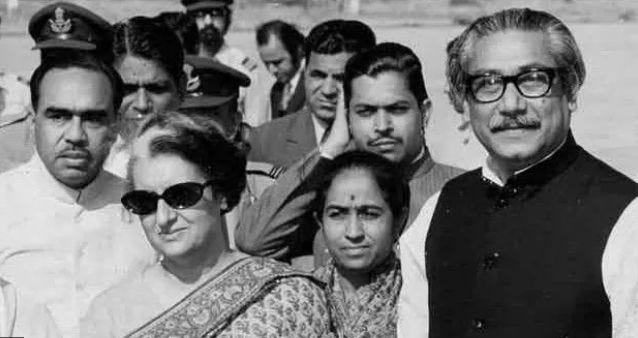
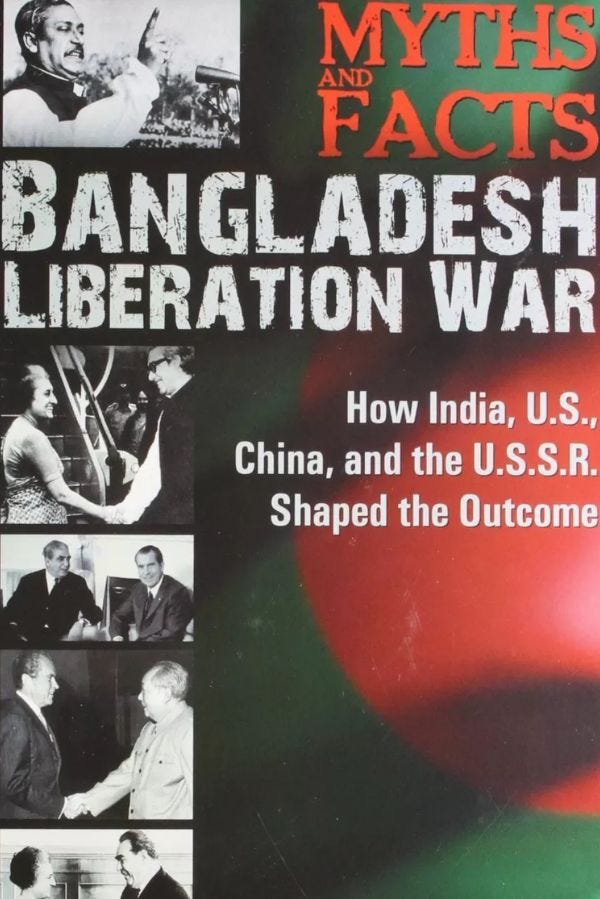
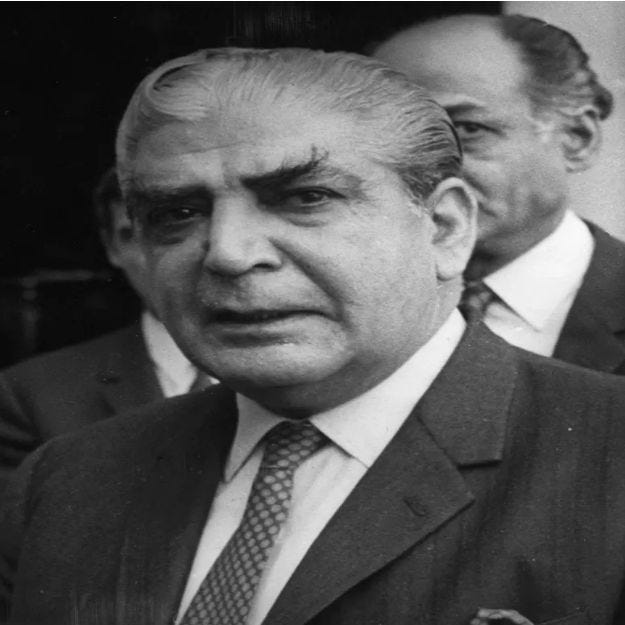
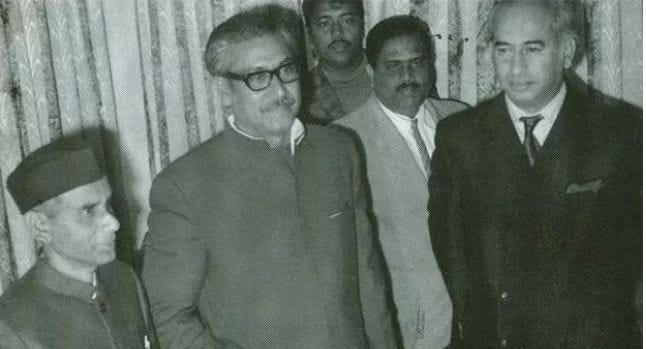
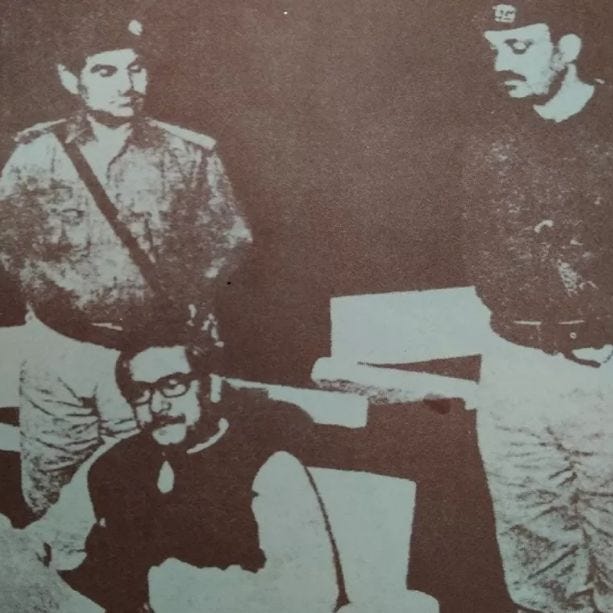



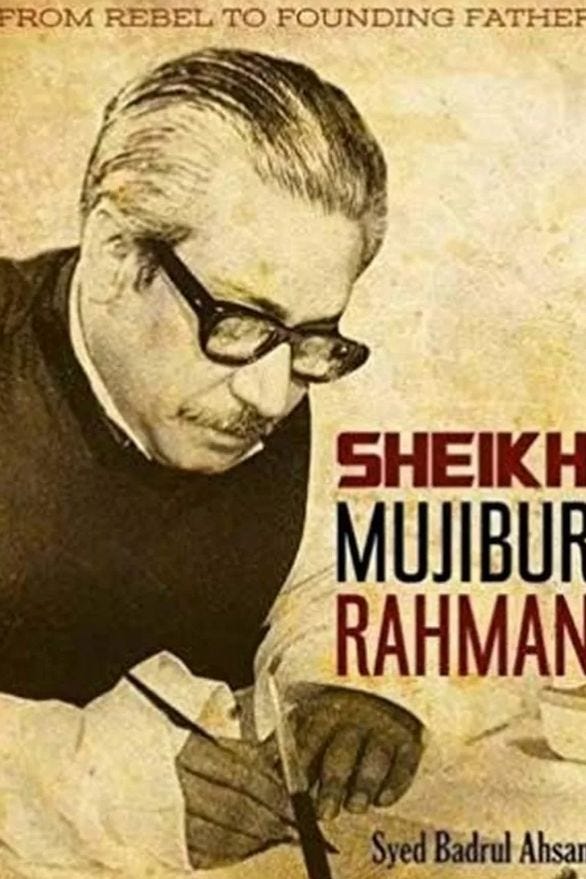
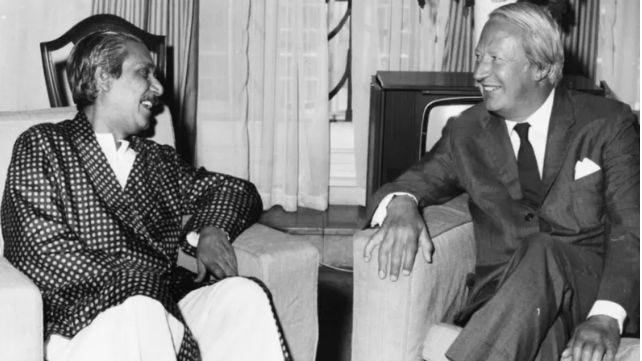




0 Comments